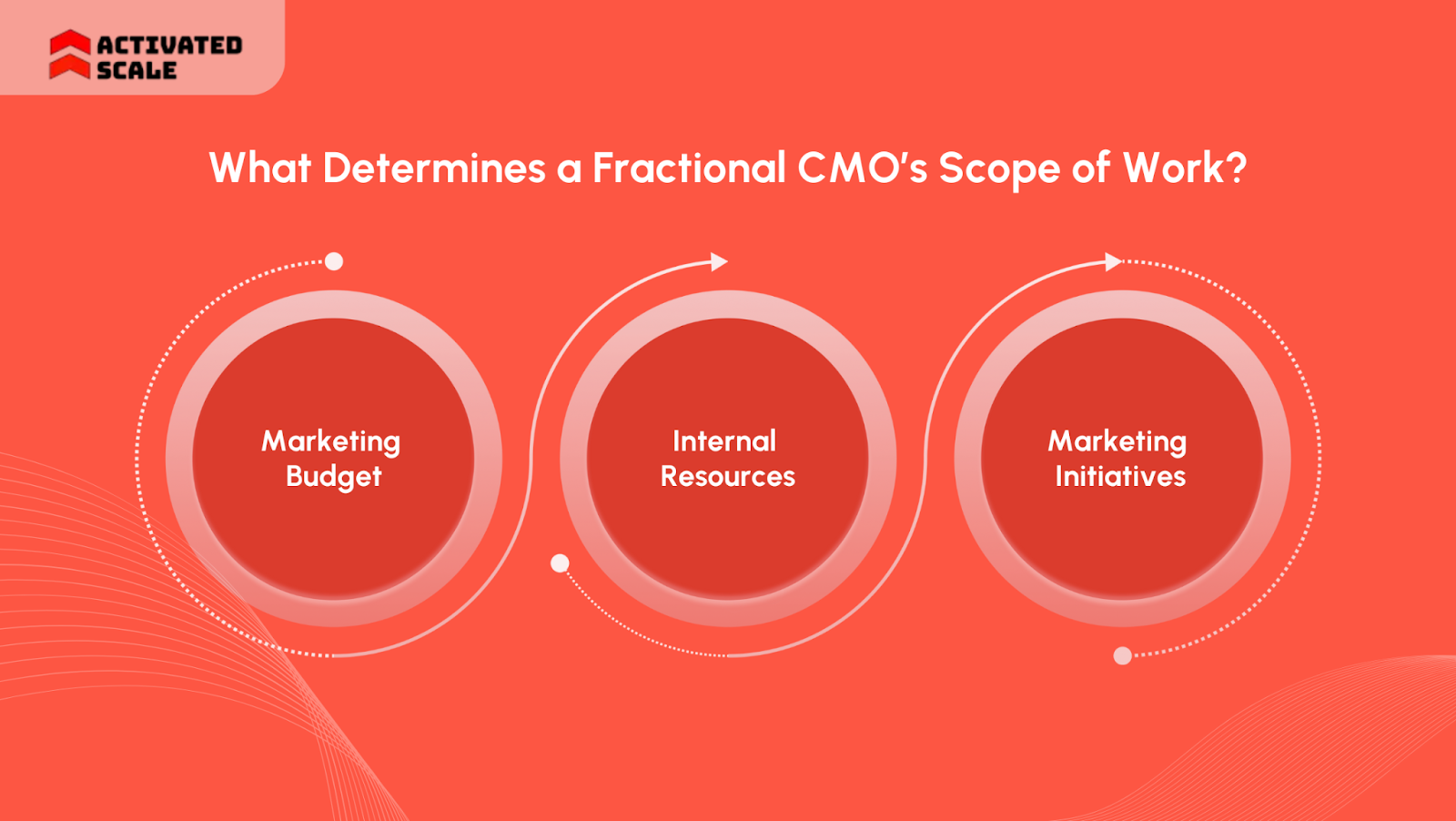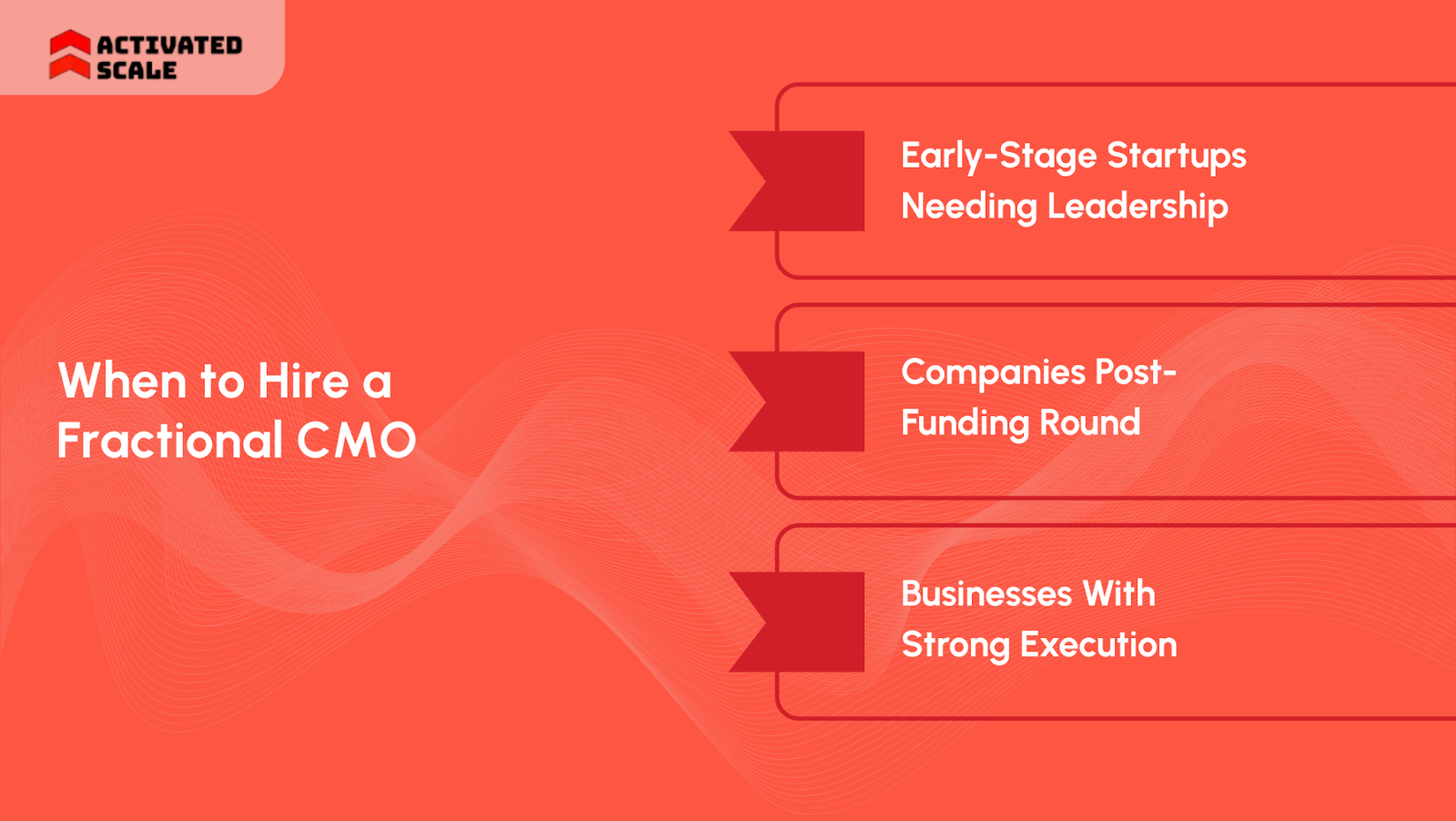Startups and growing companies often reach a point where marketing decisions feel too important to leave on autopilot, yet hiring a full-time CMO isn’t practical. At this stage, understanding the concept of fractional CMO and its scope of work becomes relevant.
A fractional leader brings strategic direction, brand clarity, and measurable marketing outcomes, without the full-time price tag. Still, the scope isn’t one-size-fits-all. It depends on the company's goals, resources, and growth stage. In this article, we’ll outline what a fractional CMO typically covers, how their responsibilities vary, and why defining this scope clearly can shape a company’s long-term success.
At a Glance
- A fractional CMO provides senior marketing leadership on a flexible, part-time, or contract basis.
- Responsibilities include developing strategies, positioning the brand, and creating marketing plans.
- They oversee execution, optimize campaigns, and streamline marketing processes.
- Review and measurement of marketing efforts ensure alignment with business goals and KPIs.
- Fractional CMOs guide teams, mentor staff, and connect marketing activities to overall growth objectives.
What Does a Fractional CMO Actually Do?
A fractional CMO is an experienced marketing leader who works with companies on a flexible basis—part-time, contract, or retainer—rather than as a permanent hire. They step into the role of strategic decision-maker, guiding how a business positions itself in the market and invests in marketing to drive growth.
Their responsibilities typically include:
- Designing and executing the overall marketing strategy
- Shaping brand messaging, positioning, and differentiation
- Aligning marketing with sales and revenue objectives
- Managing budgets and prioritizing initiatives
- Overseeing execution by internal teams or external partners
Their engagement is flexible, allowing them to work on a part-time schedule, through a monthly retainer, or under a project-based contract, depending on the company’s priorities. This setup gives businesses access to senior-level marketing leadership without the long-term cost and commitment of a full-time executive.
Read Also: How to Hire Effective Sales Leaders for Startups.
What Determines a Fractional CMO’s Scope of Work?

The exact responsibilities of a fractional CMO aren’t fixed as they shift based on the company’s priorities and capacity. Several factors influence how broad or focused the role becomes:
- Marketing budget: A larger budget allows for more ambitious campaigns, channels, and tools, while a lean budget may center efforts on the highest-return activities.
- Internal resources and team capabilities: If the company already has a capable marketing team, the fractional CMO may focus more on strategy and oversight. In smaller teams, they often take a more hands-on role.
- Nature and complexity of marketing initiatives: Entering new markets, launching products, or building brand identity from scratch often expands the scope, while mature businesses may require refinement and optimization.
These factors explain why a fractional CMO’s responsibilities differ across companies. Next, we’ll outline the areas where they typically focus their efforts.
Also Check: Top 7 Tools for Contract-Based Sales Recruitment in 2025.
5 Core Areas in a Fractional CMO’s Scope of Work

A fractional CMO’s responsibilities extend across several core areas, balancing strategy with execution. Below is a breakdown of the most common focus areas.
1. Developing Marketing Strategy
At the foundation, the fractional CMO defines the roadmap that directs all marketing activity. Their work includes:
- Comprehensive marketing plan: Setting priorities, timelines, and channel mix tailored to growth goals.
- Brand positioning: Clarifying messaging, points of differentiation, and target market fit.
- Market analysis: Reviewing competitors, audience trends, and establishing clear buyer personas.
- Budget alignment: Ensuring the marketing spend supports both short-term pipeline needs and long-term brand equity.
2. Implementation and Execution
Once the plan is set, the fractional CMO ensures it is carried out effectively.
- Collaborates with internal teams to bring campaigns, content, and programs to life.
- Oversees optimization of ongoing initiatives—adjusting spend, refining targeting, and eliminating underperforming tactics.
- Builds repeatable processes to streamline campaign execution and reduce time-to-market.
3. Marketing Review and Optimization
Regular evaluation is essential to keep marketing efforts aligned with company goals. A fractional CMO typically:
- Audit current marketing activity to identify inefficiencies and gaps.
- Monitors brand perception and messaging consistency across channels.
- Reviews how content supports sales enablement and market positioning.
- Defines and tracks KPIs such as ROI, CAC, pipeline contribution, and lead quality.
Recommended: Guide to Sales Team Structure for Outsourcing Models.
4. Brand and Digital Presence Management
Beyond planning and oversight, they safeguard and expand the company’s visibility.
- Strengthen branding and messaging across both online and offline touchpoints.
- Develop digital campaigns, from paid media to email nurturing, with a focus on measurable impact.
- Monitor campaign analytics, ensuring performance data guides future initiatives.
5. Collaboration and Team Leadership
A fractional CMO also plays a leadership role, ensuring marketing integrates with the broader business.
- Guides and mentors internal teams while coordinating with external vendors.
- Supports the marketing department with expertise, resources, and training where needed.
- Works closely with sales to align pipeline goals and go-to-market execution.
- Reports progress and insights to founders, boards, or investors, ensuring marketing performance is tied to business outcomes.
Knowing the core areas a fractional CMO covers makes it easier to identify the right time to bring one on board. The next section explains when hiring a fractional CMO adds the most value.
When to Hire a Fractional CMO

Not every company needs a full-time CMO from the start. A fractional leader becomes valuable at key inflection points in growth, such as:
- Early-Stage Startups Needing Leadership: Founders often run marketing themselves in the earliest days, but reach a point where growth stalls without experienced direction. A fractional CMO brings structure, building positioning, messaging, and go-to-market clarity—without the overhead of a permanent hire.
- Companies Post-Funding Round: After raising capital, pressure increases to prove traction quickly. A fractional CMO provides the frameworks and GTM execution plans investors expect, while ensuring the marketing budget is allocated for maximum impact.
- Businesses With Strong Execution but Lacking Strategic Direction: Some teams have skilled marketers producing campaigns and content, but lack a unifying strategy. Here, a fractional CMO connects activities to measurable outcomes, aligning execution with long-term revenue goals.
Bringing in a fractional CMO at these key growth stages ensures your strategy, execution, and team alignment are immediately effective without committing to a full-time hire.
Also Read: How to Manage Part-Time Sales Teams Effectively.
Conclusion
The scope of work of a fractional CMO is flexible by design, shaped by your company’s budget, team structure, and growth priorities. From strategy development to execution oversight and team alignment, a fractional leader can provide the marketing expertise you need without the full-time cost.
And while marketing leadership is essential, sales execution is just as critical to driving growth. That’s where Activated Scale can help. If you’re looking to build or expand your sales team, our marketplace connects you with vetted, U.S. based fractional SDRs, AEs, and VPs available on contract-to-hire or flexible fractional terms.
Get the leadership and sales talent your company needs to accelerate growth. Contact our team today.
FAQs
Q1. What is a fractional CMO?
A1: A fractional CMO is a senior marketing leader who works with a company on a part-time, contract, or retainer basis. They provide strategic guidance and oversee marketing execution without the cost of a full-time executive.
Q2. How does a fractional CMO differ from a full-time CMO?
A2: Unlike a full-time CMO, a fractional CMO offers flexible, short-term engagement while delivering the same strategic oversight. They often focus on key priorities and high-impact initiatives rather than managing all daily operations.
Q3. What factors determine a fractional CMO’s scope of work?
A3: The scope depends on the company’s budget, internal team capabilities, marketing complexity, and growth stage. Some fractional CMOs may focus more on strategy, while others handle execution and team management.
Q4. When should a company consider hiring a fractional CMO?
A4: Ideal times include early-stage startups needing leadership, companies post-funding requiring structured go-to-market plans, or businesses with execution in place but lacking strategic direction.
Q5. What results can a fractional CMO deliver?
A5: They help align marketing with business goals, optimize campaigns, strengthen brand positioning, improve team performance, and track measurable KPIs like pipeline growth, ROI, and lead quality.
The Ultimate Guide to Hiring a Salesperson!
Get the step-by-step guide to hiring, onboarding, and ensuring success!
_edi.png)




